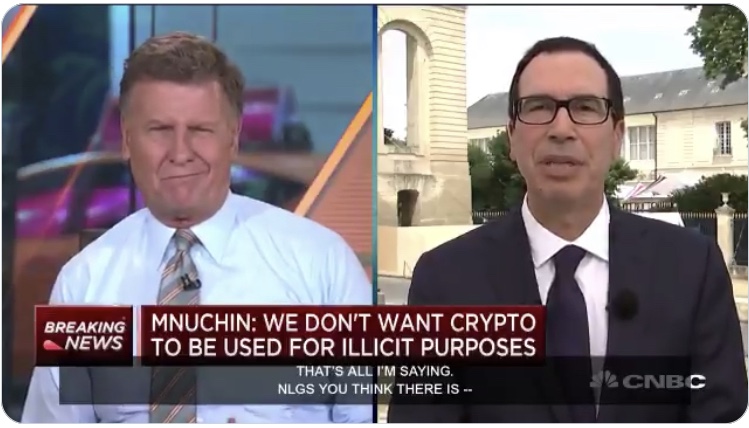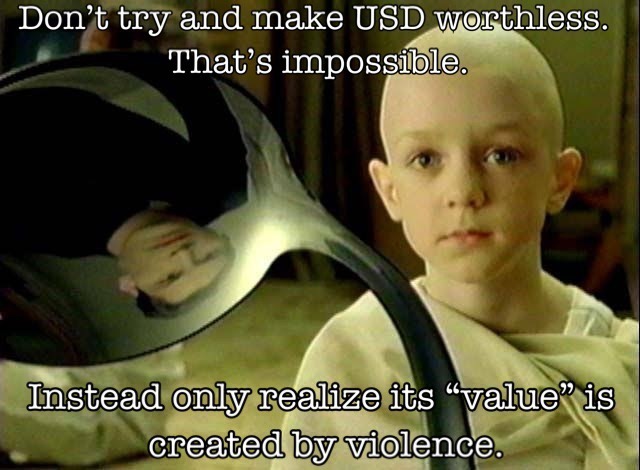U.S. Treasury Secretary Steven Mnuchin has once again weighed in on bitcoin, claiming the U.S. dollar has not been used to finance “nefarious” activity on a recent episode of CNBC’s Squawk Box. Democratic House Representative Maxine Waters also dropped a tasty nugget of a soundbite as well, sharing her thoughts on “bitcom” and the need for regulation. Such blatant demonstrations of economic imcompetence being so frequent recently, bitcoiners worldwide are left wondering about the nature of centralized regulation and the concept of authority itself.
Also read: Deutsche Bank Collapse Could Crash Global Financial Markets
Authority Is an Illusion
At the very best it is a euphemism. While “authority” can be used to denote power, it is more commonly understood as a right. Financial authorities, for example, are perceived by large swathes of individuals to have the right to determine how the finances of others are managed. Where this supposed right comes from is a mystery.
Though entities like the Federal Reserve and central banks worldwide implement financial policy — setting interest rates, outlawing currencies that compete with state fiat, and taxing the population — they are often perceived to do so with a sort of moral justification. “They are the authorities, so what they say, goes.” Ultimately, authoritarianism as a belief system can be summed up in two words: “just because.”
“Why does the state get to set interest rates?” “Why is the state able to tax individuals who don’t wish to pay for X?” “Why is the state able to outlaw competing currencies and free market competition?” The answer is always, ultimately, “just because they are perceived to be authorities on the matter.”

Another Definition, Denoting Knowledge or Expertise
One colloquial definition of authority entails an understanding not viewed as being possessed by others. For example, a neurosurgeon might be an authority on brain function. In this sense the surgeon knows considerably more than others about their particular field.
As per this definition of the word, the brain surgeon does not use force to beat people up or harm them if they disagree, but simply holds more working knowledge or experience. Even if this were the operative definition of “financial authority,” however, governments and central banks fail to satisfy this criteria in repeated, stunning fashion.

Waters and Mnuchin Are Not Authorities on Bitcoin or Money
In a CNBC interview on July 18, U.S. Treasury Secretary Steven Mnuchin defended the U.S. dollar when pressed about the fact that the currency has often been used for money laundering. When Squawk Box’s Joe Kernen mentioned that there has been “a lot of nefarious activities successfully done with cash” Mnuchin retorted:
I don’t think it’s been successfully done with cash. I’ll push back on that. We’re going to make sure that bitcoin doesn’t become the equivalent of Swiss-numbered bank accounts.
Clearly, anyone unaware of the extent to which central banks and governments have assisted in money laundering and drug-related crimes via the USD cannot be said to be an authority on money. Indeed, statistically speaking, the U.S. dollar is the leading currency being used globally to facilitate illicit and nefarious transactions.
House Representative Maxine Waters is no better when it comes to having her finger on the pulse of modern financial innovation, apparently unable to remember even the correct names of the mega successful, up-and-coming currencies preparing to outpace the dollar.

Might Makes Right
If the aforementioned definition denoting expertise or specialized knowledge doesn’t apply, it seems there’s only one definition left, and that is pure power. That is to say, the ability to apply overwhelming force to opposition. Where this view of authority is concerned, the state is the no-contest winner, to be sure. However, this approach to governance and societal management is illogical, demonstrably unsustainable, and violent. Notwithstanding, it is still the predominant and prevailing view today of what is acceptable.
Both foreign economies and individual lives have been destroyed, commandeered, targeted, and met with brute force when they oppose the synthetic monopoly of the USD via non-violent, organic market competition, time and time again throughout history.
Libya, Iraq, and now Iran stand as testaments to this reality. Individual cases such as Ross Ulbricht’s battle with the state, Aaron Swartz’s ill-fated attempt to free taxpayer funded knowledge from state-embedded paywalls, and former IRS agent Sherry Peel Jackson’s incarceration also bear witness. No matter how loudly the voices of righteous opposition seem to shout, little changes. Technology, however, doesn’t need to shout to change things. It just needs to outpace the bully called government.

The Revolution Will Be Technological
Waking individuals up philosophically to the illegitimate nature of fiat currency is most of the battle, in a very real sense. At root, it’s a matter of showing people that they own themselves, and that their money and property is theirs to dispose of non-violently as they see fit. For any other entity to claim arbitrary ownership over these things (a claim backed by violence) is to legitimize slavery.
Technology always outpaces the sluggish, collectivized movements of groups like central regulators and government. This is because individual market actors and technology don’t wait for policy or regulation before coming into being and acting. They just happen, and policy then has to catch up.
In just the past century or so alone, humanity has gone from horse-drawn carriages to self-driving electric cars and rockets. From the telegraph to instant, real-time video chat worldwide at the push of a button. With emergent platforms such as local.bitcoin.com, those who wish to trade privately, autonomously, and freely may do so thanks to technology. Mnuchin, Waters, and others can say what they will, but the tech and ability to trade in this manner are already here, regardless.

There Is No Legitimate Monetary Authority
The surgeon may be the authoritative source when it comes to performing an operation, and the master painter might be a trusted authority when it comes to color placement, but neither of these are seeking to dominate their fellow human beings by force as an institutionalized element of their professions.
Authoritarianism as exercised by modern nation states and their centralized banks is a religion. Its pro-violence adherents are cultish and afraid of what might happen should the shadowy superstitions upholding their violent belief systems be exposed to the light of day.
Technology and the free market don’t pay much mind though, and keep moving. Bitcoin and privacy-based blockchain solutions continue to grow, evolve, and proliferate. The moment a majority understand, and are willing to act on their realization that the monetary status quo is based on myth, is the moment that the idea of “authority” in the minds of billions loses its grip, and evaporates. In much the same way fear of the dark can be dispelled and overcome just by flipping on the lights. No preemptive regulation is necessary.
How do you define authority? Let us know in the comments section below.
OP-ed disclaimer: This is an Op-ed article. The opinions expressed in this article are the author’s own. Bitcoin.com is not responsible for or liable for any content, accuracy or quality within the Op-ed article. Readers should do their own due diligence before taking any actions related to the content. Bitcoin.com is not responsible, directly or indirectly, for any damage or loss caused or alleged to be caused by or in connection with the use of or reliance on any information in this Op-ed article.
Images courtesy of Shutterstock, Fair Use
Did you know you can verify any unconfirmed Bitcoin transaction with our Bitcoin Block Explorer tool? Simply complete a Bitcoin address search to view it on the blockchain. Plus, visit our Bitcoin Charts to see what’s happening in the industry.
The post The Myth of Authority: Mnuchin Denies USD Is Used Criminally appeared first on Bitcoin News.














